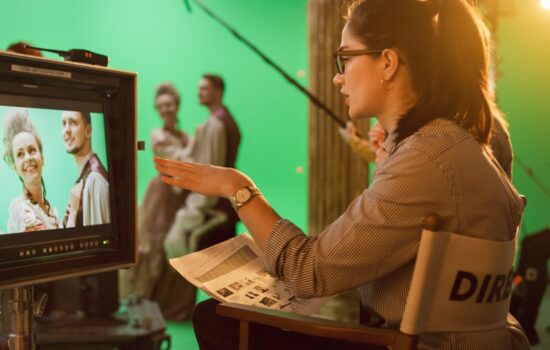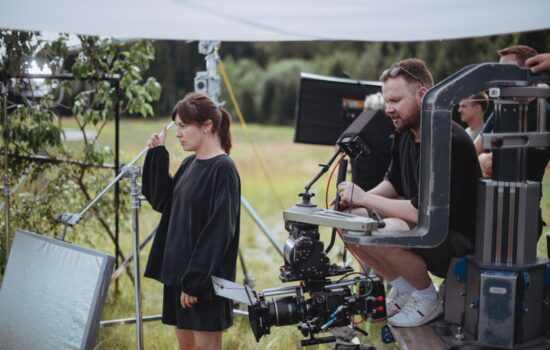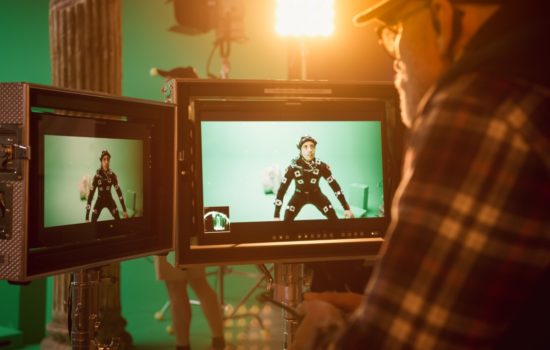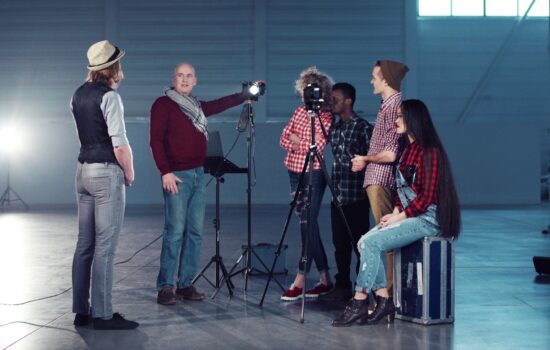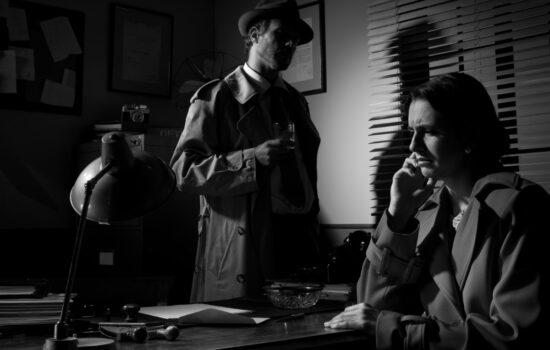Armorer
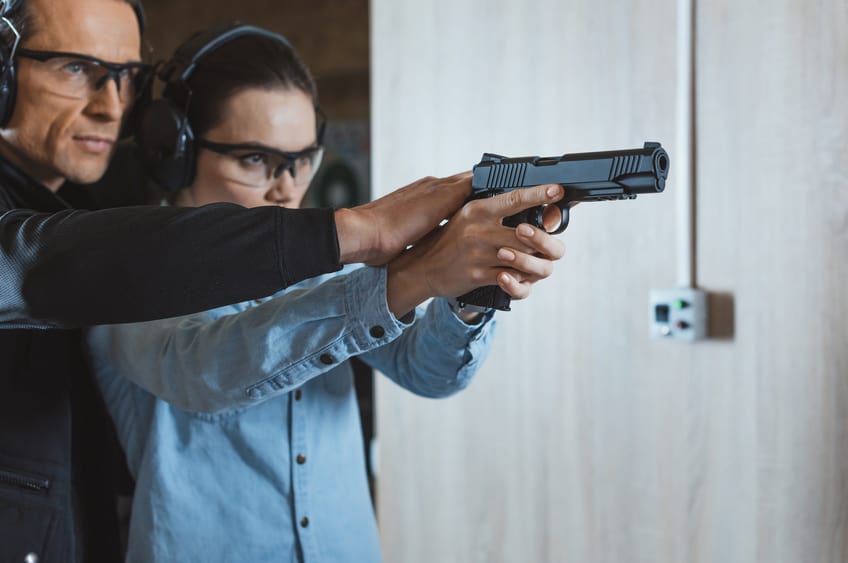
How To Become an Armorer
People also ask
Career Description
An Armorer handles all the weapons on a film, TV, or stage production. This can range from edged weapons (i.e. swords, knives, etc.) to firearms from any period. “Our company supplies the weapons, as well as a licensed Armorer with lots of experience,” says Mike Tristano, a veteran Master Armorer who has worked all around the world.
“Each one specializes in different things. Personally, I’m familiar with most all, but I am the best with the period of Old West and flintlock. On set, we go with the weapons and instruct Actors and Actresses on their safety aspects.”
“Even though the firearm uses blanks, it’s never pointed at crew, Actors, animals, or anywhere that could lead to someone getting hurt. It’s important that blanks have at least 20 feet in their line of fire clear because some weapons give powder or compress.”
Tristano adds, “We’re always there to make sure that the weapons are operated correctly, and when stunts are involved, that a rubber gun or replica is used.” If the production is using an edged weapon, there may be an additional safety expert on set, as well as a Stunt Coordinator.
What does an Armorer do?
An Armorer is a weapons and safety expert who is present during the filming of a movie if there are weapons being used. The Armorer makes sure that the cast and crew are safe at all times in the presence of those weapons and trains the Actors to use them responsibly.
Salary
The average annual salary for an Armorer is approximately $48,600. The salary range for an Armorer runs from $12,000 to $88,000.
“When starting out as an Intern or Apprentice, an individual probably won’t get paid at all. It’s free labor to break into the business,” says Tristano.
“Becoming a licensed Armorer varies state to state but can be quite expensive… The amount of money depends on the show.”
“Because there are so few Armorers, and having one on set is a requirement for weapons being present, they can dictate their pay. It usually correlates to different budgets and union tiers, but the overall wage fluctuates from $200 to $500 per eight or 10-hour day,” he notes.
If a shoot goes into overtime, an Armorer’s pay can be time-and-a-half or double time. Some shoots may even necessitate an 18-hour day, which can be tiring but lucrative for an Armorer.
What does an Armorer get paid?
According to Zippia, Armorers make an average of just over $44,000 per year. This number can highly fluctuate according to a number of factors, including experience, budget allotment for the Armorer’s salary, and the number of gigs that an Armorer books in a year.
Hey, what do you think about trying our new Film Career HelperFilm Career Helper really quick? It’s totally free and could help get your career moving fast! Give it a try. It’s totally free and you have nothing to lose.
Career Outlook
When working as an Armorer, a job could be at any time, including weekends, nights, and holidays.
Tristano says, “We pretty much run a 365-day business, 24-seven. Locations are all over the world from the United States to overseas. It’s also one of the careers on a film set that must be there the longest from when the day begins to wrap.
“Any time a weapon — especially one with blanks — is used, an Armorer must be present. This can be especially tiring because some jobs, like reality TV shows, can shoot for 45 consecutive days. It all depends on their schedule and the scenario of the shoot.”
Take a look at where an Armorer creates and stores their weapons via a tour with professional Larry Zanoff.
It’s the Armorer’s job to provide a safe environment for everyone on set. However, they work especially closely with the Props Department. Sometimes the Props Master provides elements that go with a weapon, like a holster, and other times it’s the Armorer. It varies from shoot to shoot.
Other high interface departments are the Stunt Team, Pyrotechnics, and Special Effects. Why is that? Because if there are guns, usually there are also explosions. Usually, an Armorer does dust and wall hits while if something explodes then Pyro does it. Whenever something dangerous is happening on set, everyone watches for safety. Since the Armorer runs all safety meetings involving weapons, they talk to every crew department.
Career Path
Due to the niche nature of Armorers, interested individuals need to work as an Apprentice to learn the field. This relationship will also give them their first start and a building block of experience that they can grow through freelance work.
There are no formal programs that offer instruction on how to become an Armorer in the film business.
Tristano states, “If someone wants to get into this career, they work as an Apprentice to a Master Armorer like myself. I’ve been doing this since the early ’80s. Usually, someone comes in and apprentices for about a year before taking a job on their own. When they’re training, they go to set with an Armorer and provide extra hands.
It’s all about safety on set when it comes to the use of weapons. This video gives an overview of what that weapon safety entails.
“The only real way to learn is by doing, but [this is] especially [true] as an Armorer, to really see how it’s done. It’s the learning protocol for both firearms and edged weapons. It’s very important to use all different types such as Western, medieval, and World War II [era].”
The best way for someone coming out of college or high school to work as an Armorer is to apprentice with a Master Armorer and then work in a company until they become a regular member of that company.
“Once they are certified, we encourage people to freelance as well. Our company also owns all the weapons it supplies because we’ve been accumulating them for over 30 years. So, in terms of trajectory, there is no limit to where someone can go. They can work as much as they want. Really, the more they learn, the more valuable he or she becomes, which pushes their career forward,” Tristano notes.
Getting started as an Armorer requires an individual to do an apprenticeship which also sets them up with their first job. After they’ve broken in then it’s possible for them to continue working with the company and pick up other freelance work to build their career.
Common traits of those who pursue being an Armorer include:
- Growing up around firearms. If they are already familiar with different types of guns or edged weapons, or have an early interest in them, they’ll be ahead of the curve in regard to other Armorers just starting out.
- Being a history buff. If the movie’s time period is 1878, then the Armorer must know what weapons belong there and what hasn’t been developed yet.
- Fostering social skills. Just like every other position in filmmaking, finding success as an Armorer means forging strong professional connections with others.
- Moving to a major city where film production takes place. Most Armorer companies are in Los Angeles, Florida, Georgia, and New York.
What is the training for an Armorer?
The training to become an Armorer can include any number of classes. Some of the most common include weapon disassembly and reassembly, weapon inspection, and gun safety.
Is it Armor or Armorer?
Armor is a term used for items a person might wear or use like a helmet or shield to protect themselves from injury. Armorer is a term used for the person on a film set who oversees the safe and responsible usage of weapons.
Experience & Skills
The most important skills a person can develop that will make them more likely to land an apprenticeship will be those involving weapons safety. Good study habits are also a major plus. Tristano states, “I get about 25 to 50 emails each month asking to intern or apprentice with us. We only have so much room to take people in.
“I look for someone who is open to learning and putting in the time. They must learn the history of firearms and have a general interest in weapons. The pay is good, which attracts a lot of people, but this job must be done because you love it or else you’ll burn out.
“When I’m evaluating someone’s prior experience or special skills, I’m trying to figure out if they’re a history buff or have experience with firearms. Since so much of the job is contingent on getting an apprenticeship, a person needs to prepare for that the best they can through learning weapons safety and developing an interest in history.”
Though there is no formal program in place for aspiring Armorers, this video provides a look at the type of training you might undergo as you learn the craft.
An Armorer must also be good with people. When working on set, they have to make people feel comfortable with a potentially dangerous item that they may not have used before. The surrounding crew and cast must also feel safe and comfortable. “Really, a person needs to be as much of an Armorer as a Psychologist to keep everyone feeling good,” explains Tristano.
He continues, “The best way to do that is to get to know the Actors and teach them how to use the weapon properly. Also, I think there should be more women in the field. They have worked out well in scenarios where an Actress wants to deal with a female instead of a male. It’s good to have that option so people can feel as comfortable as possible.”
The most crucial personality aspect of an Armorer is the ability to stay relaxed when teaching people and to make sure everyone is comfortable, even if they’re being shy about asking questions.
What is an Armorer vs. Gunsmith?
A Gunsmith is a person who works in the repair or manufacturing of weapons. An Armorer is a person trained to responsibly handle weapons on a film set and train others to use them in a safe manner as well.
Education & Training
“The Armorer acts as a historian regarding the weapons. Therefore, they must study exactly what weapon would be correct for the time but also answer any questions an Actor or Actress has on it. Getting a history degree or studying in a person’s private time can be good, but the best is to be a sponge on set as an Intern or Apprentice,” explains Tristano.
This is a very specific type of career. There have been thousands of edged weapons and firearms throughout history. The longer someone is in the industry, the more they’ll learn and be able to accurately bring that to a film. Therefore, it can be good to take classes in history and weapons safety. When they are learning on set, that person will have a boost to help contextualize what is going on in that specific time period.
What qualifications do you need to be an Armorer?
At minimum, an Armorer must have prior experience working as a Gunsmith, Firearms Instructor, or Official at a firing range. Given the life-or-death importance of this position, it’s critical that an Armorer have extensive knowledge of gun equipment, usage, and safety.
Additional Resources
Unfortunately, few online resources and professional organizations are available for individuals interested in becoming an Armorer. Tristano offers, “I’m happy to answer questions via phone or email. Also, doing internships doesn’t hurt. At the end of the day, an Armorer is kind of like a vendor. They are their own independent department on set.
“Some people will join the Prop Masters’ Union but that is really a different category. It is very expensive and difficult to become certified as an Armorer, which varies from state to state; therefore, an aspect of the job is that it can be niche. Everybody knows everybody. But there’s always guns in movies so work is always there.”
Since working as an Armorer is so heavily based on practical experience, the best thing to do is to get in touch with a Master Armorer and talk with them. Otherwise, joining groups that are enthusiastic about weapons or history can be beneficial as well. This could be a local in-person club or even a Facebook group.
FAQ
What is the single biggest suggestion you would give to someone wanting to get into this career?
“The biggest suggestion I have is to make sure that being an Armorer is a career to which you’re willing to devote your life. It’s a major lifestyle choice. It can’t be stressed enough that becoming an Armorer is a freelance career. Maybe there won’t be work every day. Or it could be ongoing, jumping from movie to movie. That has a big effect on a personal life.”
“It takes a while to develop a reputation and create the financial stability that allows for flexibility. Even then, it’s a life commitment, because a great Armorer is always studying and learning in their free time when not on set.”
What’s the #1 mistake people make when trying to get into this career?
“Like any business, if someone gets into it just for money and not for the love of what they’re doing, then it will be detrimental to their career potential. Armorers must love to be on set. When I’m on set, especially working on a period film, that’s the happiest I can be. It isn’t just about guns but the interaction with people and how it’s incorporated into the filmmaking process, which can be tedious, boring, and slow.”
“The only way to truly succeed is to love working with Actors and Actresses, continually making them look great on camera. A lot of Armorers like guns but not people, which stunts their careers. It has been my privilege to work with some of the great stars out there. I count it as one of the best things about the job.”
What is the question people should ask about this career but rarely do?
“How much time is required to become a proficient Armorer?”
“The amount of time it takes to become an Armorer entirely depends on the individual. Some people pick it up incredibly fast, while others take a long time. Some people are naturals. They have an affinity for guns and making people feel relaxed. They understand the safety concerns and how to follow the correct procedure.”
“No matter how talented someone is, there is still at least a year’s worth of apprenticeship required to build a foundation. Unfortunately, when someone tries to rush the process, people get injured and killed on set. When done correctly, this career provides complete safety on set. However, when it isn’t, it can lead to disaster.”
If you could describe in one word what makes you successful, what would it be?
“Patience.”
Sources

Mike Tristano
Although he himself denies it, Armorer Mike Tristano is a nearly legendary figure in the world of independent cinema and “B” movies.
His body of work as an Armorer, On-set Weapons Handler, and Special Makeup Effects Artist is truly amazing and some of the low-budget films he has written and directed have become underground cult classics. He is the only “true” non-union supplier of movie weaponry and armorer services, historical and military props, special makeup FX and weapons-related effects.
Always believing that independent and low-budget filmmakers should have access to the same quality of weapons and special makeup effects for their films as the major studios, he always makes his services affordable and still maintains top quality in his work. His incredible and ongoing number of credits and his sterling reputation are an undeniable testimony to that fact.
After a shadowy career in international military intelligence, freelance weapons advising, K&R consulting and executive security, Mike returned to the United States full-time and began his career in the motion picture industry.
Since then, he has worked with many of the great independent film Directors and Producers, including:
Roger Corman (one of his mentors, for whom he has done more than thirty films), Sam Raimi, David Worth, Fred Olen Rey, Jim Wynorski, William Mesa, Michael Landon, Jr., John Eyres, Chuck Russell, Don Coscarelli, Brian Yuzna, Adam Rifkin, Stephen Norrington, The Polish Brothers, Kevin Tenney, Victor Salva, Jeff Burr, Charles Band, Mark Lester, John Terlesky, Phillip Roth, Andrew Stevens, Joey Travolta, Sam Firstenberg, Avi Lerner, Menachem Golan, Kim Manners, Jesse Johnson, David Ayer, and hundreds of others.
He has probably trained and worked on set with half of the actors and actresses in Hollywood, instructing them on how to handle firearms, and how to look good doing it. That list of Hollywood legends is almost endless.
In 1990, Mike also began writing, directing and producing. He directed his first feature film that year, a low-budget horror film called Feast, which became an underground cult classic. He soon followed that up by directing three more films that would achieve cult classic status: The Flesh Merchant, The Demon Lover and Body Count.
Over the next fifteen years, he continued writing and directing brutal, intense horror and action films that constantly pushed the boundaries of violence, gore, and sex. Among his other directorial efforts are Never Look Back (both a Cannes Film Festival and American Film Market Official Selection), The Savage Season, CyberSeeker, Dark Nova, The Killing Point, Ultimate Prey, Invitation to Die (aka Warrior of Justice) and the notorious exploitation 1970s grind-house style films Wasteland Justice and Cannibal Taboo.
In early 2006, he directed the controversial adult horror film The New Neighbors which was released in September of that year. He continues to write and direct edgy, controversial horror and action features.
References
- 1Multiple. "Armorer Salary in Santa Monica, CA". Zip Recruiter. published: . retrieved on: April 13, 2020
